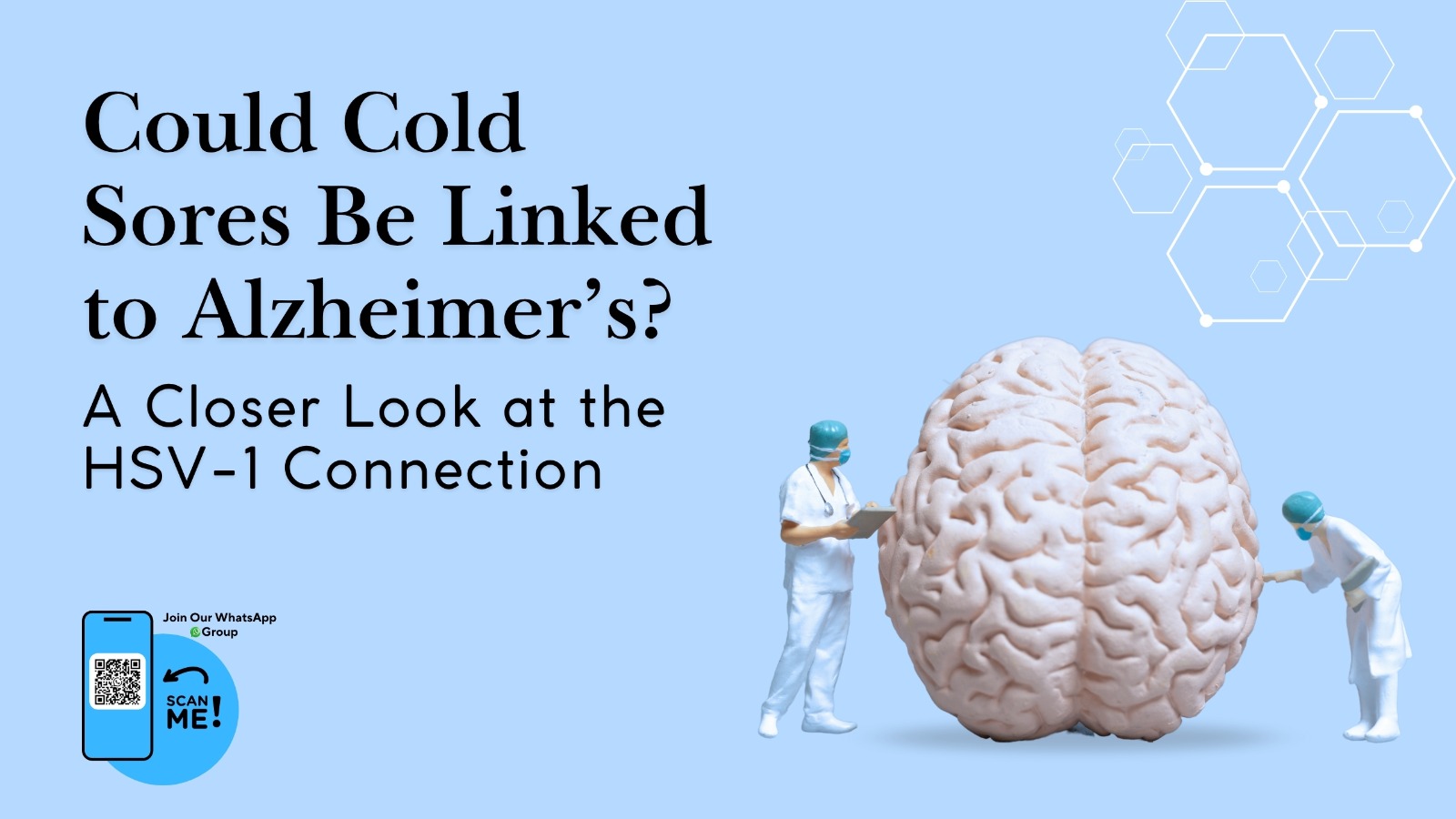Could Cold Sores Be Linked to Alzheimer’s? A Closer Look at the HSV-1 Connection
Written By: Dr. Janhvi Ajmera

A Surprising Association
When we think about Alzheimer’s disease, our minds usually think about aging, genetics, and maybe even cardiovascular risk factors. But a recent study brings an unexpected player into the picture, herpes simplex virus type 1 (HSV-1), the virus responsible for cold sores.
The idea that a common virus could be linked to a complex neurodegenerative disease like Alzheimer’s might sound surprising. But it’s not entirely new and recent findings are giving it more weight.
What the Data Tells Us
The study analyzed data from IQVIA PharMetrics Plus, a large U.S. insurance claims database covering over 200 million individuals. Researchers looked at a group of more than 344,000 people diagnosed with Alzheimer’s disease and compared them to a carefully matched group of controls. The goal was to see if there was a difference in the rates of HSV-1 diagnosis between the two groups.
The results showed that individuals with Alzheimer’s were nearly twice as likely to have a documented HSV-1 infection compared to the control group. While the absolute numbers were small (under 1% of patients had a recorded diagnosis of HSV-1), the relative difference was significant, an 80% increased odds of developing Alzheimer’s among those with HSV-1.
Antiviral Therapy and Risk Reduction
Even more interesting was the secondary finding, that patients who had been treated with antiviral medications showed a 17% lower risk of developing Alzheimer’s compared to untreated individuals with HSV-
This leads us to further questions. Why would antivirals, commonly used to suppress cold sore outbreaks have any effect on neurodegeneration? Is the virus somehow contributing to the disease process? And if so, could early or chronic suppression change outcomes?
The idea is speculative but fascinating. HSV-1 has been found in the brains of some Alzheimer’s patients, and there’s evidence from animal studies that viral reactivation may trigger neuroinflammation and even amyloid plaque formation. While we can’t conclude causality from this data, it points towards a therapeutic possibility that could be explored in future research.
Why It’s Hard to Interpret
There are some important limitations to consider.
- First, HSV-1 is extremely common. Most estimates suggest that up to two-thirds of the global population carries the virus, many without ever showing symptoms. The fact that only a tiny percentage of individuals in this study had a documented diagnosis suggests that majority of HSV-1 cases simply go unrecorded in the healthcare system.
- This underreporting could turn the data in unpredictable ways. It’s possible that only those with more frequent or severe symptoms are getting diagnosed and treated. Which means that the group we’re looking at may not represent the broader HSV-1-positive population.
- Second, this was a retrospective observational study based on insurance claims data. It shows correlation but no causation. It’s completely possible that other unmeasured variables (such as immune status, socioeconomic factors, or general healthcare access) could influence both HSV-1 diagnosis and Alzheimer’s risk.
- With these warnings, the signal is strong enough that it shouldn’t be dismissed outright.
Making Sense of the Mechanism
So how could HSV-1 potentially influence Alzheimer’s disease risk?
One leading theory is that repeated reactivation of the virus in the central nervous system could cause chronic low-grade inflammation. Over time, this might promote the kind of cellular stress that leads to tau tangles and beta-amyloid plaque accumulation, the hallmarks of Alzheimer’s pathology.
This mechanism has been supported by some lab-based and epidemiologic studies. In mice, HSV-1 infections have been shown to trigger the formation of amyloid plaques. In humans, a Swedish study found that individuals with high HSV antibody levels had twice the risk of developing dementia, even when adjusting for other risk factors.
What we’re seeing here is the gradual convergence of multiple lines of evidence,from bench science to big data that points in the same direction.
What This Means in Practice
As clinicians, we often look for ways to reduce risk in our patients, especially when it comes to diseases like Alzheimer’s, where current treatment options are limited and prevention is key.
This study doesn’t change our standard of care right now. We’re not recommending screening all patients for HSV-1, and we’re not prescribing antivirals to prevent dementia. But it does raise important questions, especially for patients who already experience frequent HSV-1 outbreaks.
If these individuals are already candidates for antiviral treatment, there may be an added potential benefit in the long run, though we’ll need better evidence from randomized controlled trials to say for sure.
Looking Ahead
- Alzheimer is a multifactorial disease and the more we learn, the more we realize how many systems it touches. From vascular health to infection, immunity to inflammation, it’s likely that multiple pathways feed into the neurodegenerative process.
- The idea that something as common as a cold sore could play a role is a powerful reminder of how complex the brain really is.
- Future research will need to dig deeper into the role of chronic viral infections in neurodegeneration and explore whether antiviral strategies can slow or prevent cognitive decline in at-risk populations.
For now, this evolving evidence gives us another angle to consider, and perhaps another piece of the puzzle in understanding one of medicine’s most challenging diseases.
Reference:

